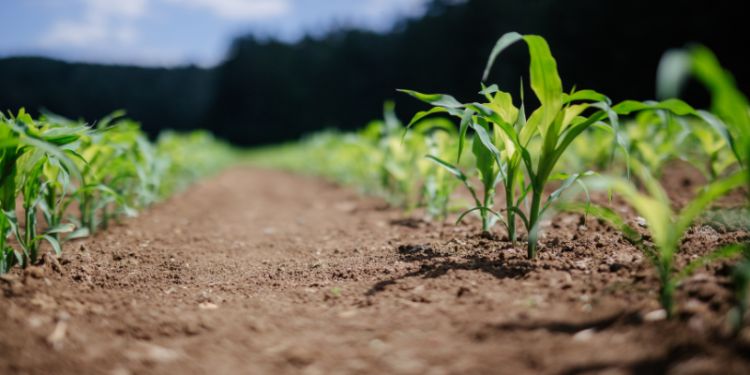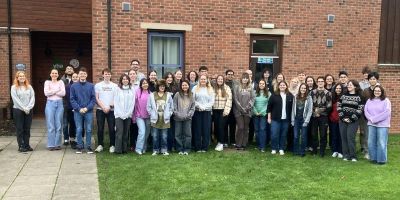Building resilient food systems for a healthier future

For World Food Day, we shine a light on our food related research.
Over the coming decades, a changing climate, growing global population, increasing food prices and environmental stressors will have significant yet uncertain impacts on global food security.
In the Faculty of Biological Sciences, we’re working with internal and external researchers, as well as interdisciplinary networks to deliver high quality and challenge-led research, to both drive our teaching activity and overcome this urgent challenge.
For World Food Day 2023 – organised by the Food and Agriculture Organisation of the United Nations – read how we’re taking action.
Achieving zero hunger and sustainable agriculture
The ‘Achieving zero hunger by 2030’ objective set out by the United Nations Sustainable Development Goals requires the doubling of agricultural productivity while ensuring the resilience of food production systems to climate change.
One strategy to increase global crop yields is to maximise how plants use their resources, both above- and below-ground in order to minimise carbon inputs, such as polluting fertiliser, while producing more crops.
The Kepinski lab in the School of Biology is leading on pioneering research into understanding the angle at which a branch grows in relation to gravity – what scientists call the gravitropic set-point angle (GSA) concept.
Their research showed that an anti-gravity mechanism – also known as the anti-gravitropic offset (AGO) - counteracts the plant’s underlying response to gravity to allow growth at non-vertical angles.
In their most recent paper, they’ve since found that a certain type of PIN protein – PIN7 - is a better facilitator of upward growth in the roots of plant Arabidopsis – a type of cress plant.
They also found that auxin makes rooting angles more vertical by stabilising another significant protein – RCN1, found in gravity sensing root cells.
This promising news suggests there’s a strong possibility that, with further research, proteins that drive plant growth can be engineered to drive steeper, deeper rooting to improve the way plants capture their nutrients, such as nitrogen. The more efficiently crops can do this, the richer – and more sustainable – the crop.
“By identifying the molecular basis of gravity-dependent non-vertical growth, our work could pave the way for exciting new tools for the manipulation of root systems.
This has huge potential to reduce reliance on environmentally damaging synthetic fertilizer and irrigation, thereby increasing the sustainability of crop production.
Understanding how plant cells communicate
The Benitez-Alfonso lab is exploring how plant cells communicate with each other using special channels, known as plasmodesmata. Studying these channels can reveal how molecules regulate plant development and respond to the environment.
Unlike human and animals, all plant organs emerge from two main stem cells located in the shoots and the roots. Coordinating the formation and function of plant organs is extremely important in plants as they need to respond fast to changes in the environment.
Cell-to-cell transportation of signals – which is facilitated by plasmodesmata – is essential in growing healthy plants, however it also means that pathogens, such as viruses, can move quickly too, spreading diseases and leading to crop losses.
Researchers in the Benitez-Alfonso lab are looking at ways to manage this transportation by exploring what happens when you change these channels to see how this impacts plant growth which could improve farming.
Our world leading smart farm
Following millions of pounds of investment, the University of Leeds Farm is being developed as a digitally-connected smart farm and terrestrial observatory. The site hosts the National Pig Centre, a leading research facility for pig nutrition, behaviour, health and production system research.
This smart farm, which involves award-winning researchers in the Faculty of Biological Sciences with a range of expertise, incorporates advanced monitoring and sensing technologies, either fixed or attached to drones and robotic crawlers, that monitor a range of conditions across the farm in real time.
This multi-systems approach means the farm can be used to deliver data-driven solutions across the whole food system – from the farm, through the supply chain, to the consumer.
Research covers a range of areas such as insect farming, gut microbiome in pigs and pig welfare.
Take a virtual tour of our smart farm.
Soil matters: the power of regenerative agriculture
Regenerative agriculture is a farming system and grazing that limits soil disturbances and keeps soil covered. This helps rebuild soil organic matter and restore degraded soil biodiversity, which helps strengthen the many benefits of soil.
Regenerative agriculture has become increasingly popular with producers, retailers, researchers and politicians, as it could provide opportunities to produce food and simultaneously restore historically degraded land.
Dr Ruth Wade, Research Fellow in Regenerative Farming Systems in the Faculty of Biological Sciences, is part of the FixOurFood programme, an interdisciplinary project led by the University of Leeds which is exploring the impact of regenerative farming systems in Yorkshire.
The project focuses on:
• Understanding the current system
• Supporting regenerative farming
• Evidence-based practice
• Sharing of the information
Watch this virtual seminar to learn how experiments at the University of Leeds Research Farm are measuring the impacts of changing practices on the soil, crop, greenhouse gas emissions, yield, and profit.
You can also keep up to date with upcoming webinars from Global Food Environment Institute by signing up to their newsletter.
Exploring the role of temperature to maximise crop yields
The Dixon Lab is leading on research into sustainable wheat and the role of temperature in controlling plant growth and development.
Temperature is an important factor in how much a crop can yield because it helps coordinate flowering with the environment, a crucial relationship for successful plant reproduction and the amount of seeds a plant can produce.
Researchers know that the genes of a plant are at play here and are working to understand which ones control the rate of this transition and apply this learning to grow crops which are more robust to changes in temperature.
As part of our research into the role of temperature on plant growth, our scientists are also exploring vernalization – a process which exposes a plant to cold temperatures in order to stimulate flowering or enhance seed production sooner.
To better understand how genes are interacting with this each other during this process, they’re combining genetics, molecular and developmental biology which will help drive innovation, specifically in growing crops for breakfast cereals.
Anxious plants – understanding how plants make their decisions
Unlike animals, plants can’t move location if their environment becomes unfavourable. This means plants have evolved to be very careful about using resources in their environment, since they have no certainty that resources will be available in the future.
This also means that plants typically don't grow as much as they could with the resources available. This creates a problem in agriculture, where humans provide abundant fertilizer to crops, but the plants fail to maximise their growth because of their inherent ‘caution’.
Research in the Bennett Lab aims to understand the signalling mechanisms that lead to this caution, and to find ways to persuade crops to better utilise the resources provided to them. For instance, in a UKRI-funded project, the Bennett Lab is trying to increase the sensitivity of barley to the plant hormone cytokinin, in order to increase the length of time that the plant flowers for.
In another project in the Bennett lab, Alex Wakeman, a postgraduate researcher, is working on research to understand how wheat plants coordinate the seed they make with the availability of space and resources in their environment, so we could potentially grow plants with greater yields without having to increase fertilizer or use of land.
We’re always open to working with new academic and industry collaborators. Contact our staff by visiting our staff profile page.




